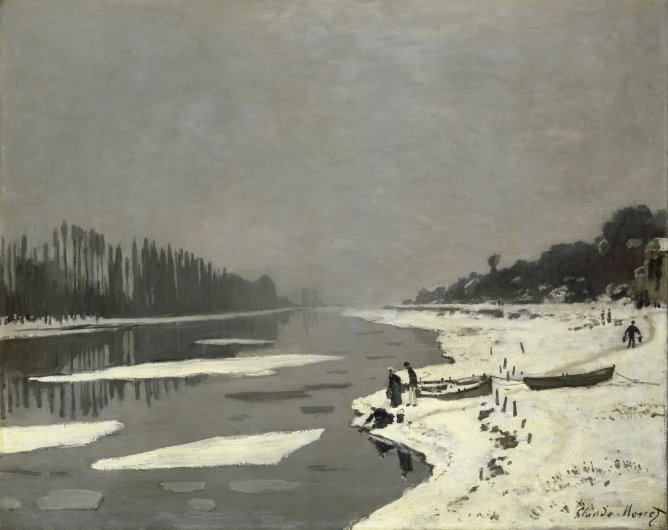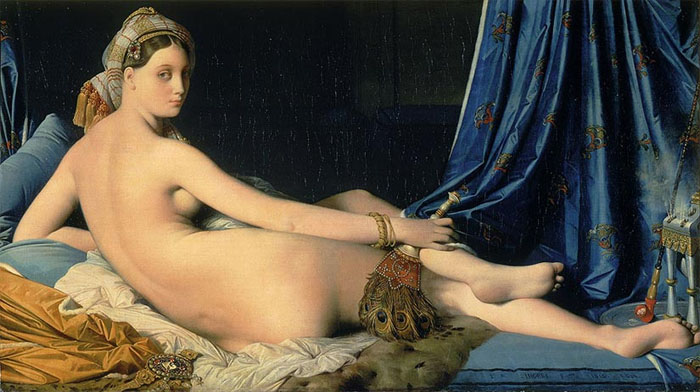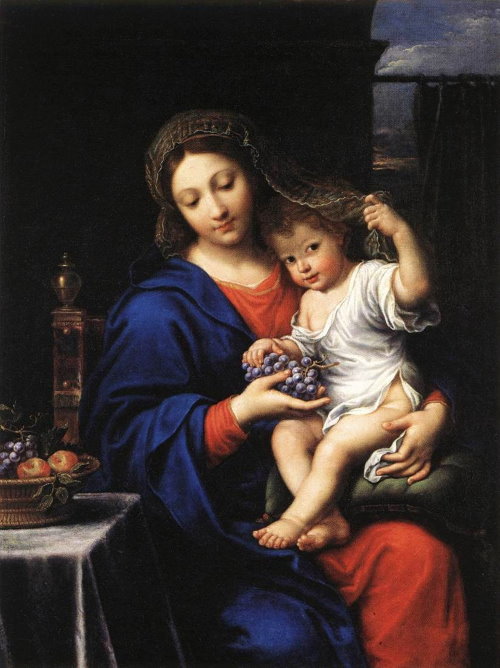French paintings in Louvre Museum. Monet

French paintings are well represented in the Louvre Museum. Complemented by Musée d'Orsay and its collection of Claude Monet and other French impressionist artists, the Louvre Museum displays the world's most beautiful and complete collection of paintings by French artists up to the 19th century anywhere in the world. Louvre Museum.
Top French paintings in the Louvre
The collection of paintings by French artists of the Louvre Museum is unique. Jean Fouquet, Nicolas Poussin, Pierre Mignard, Le Nain brothers, Philippe de Champaigne, Charles Le Brun, Georges de La Tour, Antoine Watteau, Jean-Honoré Fragonard, Madame Vigée Le Brun, Hubert Robert, Jean-Baptiste Greuze, Jean-Auguste-Dominique Ingres, Jean-Baptiste Camille Corot, Eugène Delacroix are among the best represented 16th to 19th century French artists in Louvre Museum. Locate the French painting department on Louvre Museum map PDF. The collection is worth a trip by itself.
The Louvre is huge. Book a guided tour for convenience.
Most impressionnists paintings and Monet paintings in Paris are in Musée d'Orsay, Musée Marmottan and Orangerie.

Madame de Pompadour - 1755 - Delatour
Claude Monet paintings of Louvre Museum are in room 903
The Louvre Museum once had fabulous Impressionist painting collections as a result of donations by visionnary art collectors Gustave Caillebote, Étienne Moreau-Nélaton, Isaac de Camondo and Antonin Personnaz. The bulk of these impressionist collections have been transferred in 1986 to Musée d'Orsay in the opposite river bank.
The French painting department of the Louvre nevertheless presents a fine collection of Renoir, Sisley, Degas, Jongkind, Boudin, Cézanne, Pissarro, Toulouse-Lautrec, and three Monets from the Hélène and Victor Lyon donation, which entered the Louvre in 1977. The famous Glaçons à Bougival by Claude Monet is exposed in room 903, Aile Sully level 2.
In Glaçons à Bougival, a village at the time near Paris, Claude Monet captures the foggy atmosphere of winter in broad strokes of almost monochrome paint. The sky and the water blend into a harmony of gray tones. A few characters, coming to draw water with their buckets, drawn with lively and precise brushstrokes, animate the river bank breaking the impression of immobility. The ice, floating on the surface of the water, will become an important theme in his work.
Glaçons à Bougival by Claude Monet - Louvre Museum French paintings department
Glaçons à Bougival by Claude Monet are in room 903 of Louvre Museum French paintings department

Stay in top Paris hotel with indoor pool

Liberty Leading the People – Eugène Delacroix - Louvre French paintings department
Liberty Leading the People (1830) by Eugène Delacroix is in the Louvre Museum French paintings department. Liberty Leading the People has been restored in 2024. It is now more contrasted and gained new life and strength.

The Paris uprising of July 1830, the Trois Glorieuses, was initiated by the republicans for violation of the constitution by Charles X, the last Bourbon King of France. He was overthrown and replaced by Louis Philippe, the last King in French history. Eugène Delacroix, a 19th century French artist, witnessed in this painting the uprising and perceived it as a modern subject which he painted with romantic fervor. A woman personifying Liberty leads the people forward over the bodies of the fallen, holding France's national flag and brandishing a musket.
In 1830, Delacroix was already the leader of the Romantic school in French painting. He rejected the emphasis on precise drawing which then characterised academic art.
La grande Odalisque – Ingres - Louvre Museum French paintings department

Jean-Auguste-Dominique Ingres was a a 19th century French artist. He considered himself to be a painter of history in the tradition of Nicolas Poussin and Jacques-Louis David. But, by the end of his life, Ingres's portraits were recognized as his greatest legacy. La Grande Odalisque, his most famous nude painting, was commissioned by Caroline Murat, Napoleon's sister. An odalisque is a concubine in the orient. Ingres transposed the theme of the mythological nude to an imaginary Orient. He painted a nude with long, sinuous lines bearing little resemblance to anatomical reality, but rendered the details and texture of the fabrics with sharp precision. The exhibition of La Grande Odalisque at the Salon of 1819 drew sharp criticism. Ingres was seen as disregarding anatomical reality. Another great work by Ingres in Le Louvre is the Turkish Bath.
The Virgin of the Grapes - Mignard
"I am the true vine and my Father is the winemaker" (John 15: 1)
This French painting is a testimony of the catholic faith in the 17th century. The Virgin is sitting. She wears a red dress covered with a blue coat and holds Jesus in her left arm. With her right hand, she presents the child with grapes. Jesus caresses the grapes with his right hand and raises with his left hand the veil that covers the head of his mother.
Pierre Mignard was born in Champagne in 1610, he entered Poussin's studio, then left to improve in Rome. He did not leave this city until 1653. He married there and brought back from Italy a whole series of Virgins.
Back in Paris, Pierre Mignard worked for the ladies of the court in Versailles, then became the official painter of Sun King. He decorated the dome of Val de Grâce in Paris and the small apartments of Versailles. He died in 1695.

Virgin of the grapes - Mignard - Louvre Museum
Pierrot (1719) - Antoine Watteau
Antoine Watteau (1684 - 1721), a XVIIIth century French artist, spurred in his paintings the revival of interest in colour and movement in the tradition of Rubens.
Watteau is credited with inventing the fetes galantes, scenes of bucolic and idyllic charm. Some of his best known subjects were drawn from the world of Italian comedy and ballet. The character of Pierrot in the Commedia dell'Arte was staged to be the fool. Watteau's sad clown has reason to be sad as he may be destined for a broken heart. Traditionally, the Pierrot's love interest, Columbine, leaves him for Harlequin. Despite his fate, the character of Pierrot is trusting, proves to be naïve and distant to reality.

Pierrot - Antoine Watteau - Louvre Museum